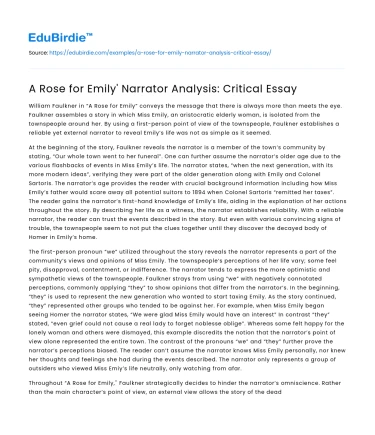William Faulkner in “A Rose for Emily” conveys the message that there is always more than meets the eye. Faulkner assembles a story in which Miss Emily, an aristocratic elderly woman, is isolated from the townspeople around her. By using a first-person point of view of the townspeople, Faulkner establishes a reliable yet external narrator to reveal Emily’s life was not as simple as it seemed.
At the beginning of the story, Faulkner reveals the narrator is a member of the town’s community by stating, “Our whole town went to her funeral”. One can further assume the narrator’s older age due to the various flashbacks of events in Miss Emily’s life. The narrator states, “when the next generation, with its more modern ideas”, verifying they were part of the older generation along with Emily and Colonel Sartoris. The narrator’s age provides the reader with crucial background information including how Miss Emily’s father would scare away all potential suitors to 1894 when Colonel Sartoris “remitted her taxes”. The reader gains the narrator’s first-hand knowledge of Emily’s life, aiding in the explanation of her actions throughout the story. By describing her life as a witness, the narrator establishes reliability. With a reliable narrator, the reader can trust the events described in the story. But even with various convincing signs of trouble, the townspeople seem to not put the clues together until they discover the decayed body of Homer in Emily’s home.
Save your time!
We can take care of your essay
- Proper editing and formatting
- Free revision, title page, and bibliography
- Flexible prices and money-back guarantee
The first-person pronoun “we” utilized throughout the story reveals the narrator represents a part of the community’s views and opinions of Miss Emily. The townspeople’s perceptions of her life vary; some feel pity, disapproval, contentment, or indifference. The narrator tends to express the more optimistic and sympathetic views of the townspeople. Faulkner strays from using “we” with negatively connotated perceptions, commonly applying “they” to show opinions that differ from the narrator’s. In the beginning, “they” is used to represent the new generation who wanted to start taxing Emily. As the story continued, “they” represented other groups who tended to be against her. For example, when Miss Emily began seeing Homer the narrator states, “We were glad Miss Emily would have an interest” In contrast “they” stated, “even grief could not cause a real lady to forget noblesse oblige”. Whereas some felt happy for the lonely woman and others were dismayed, this example discredits the notion that the narrator’s point of view alone represented the entire town. The contrast of the pronouns “we” and “they” further prove the narrator’s perceptions biased. The reader can’t assume the narrator knows Miss Emily personally, nor knew her thoughts and feelings she had during the events described. The narrator only represents a group of outsiders who viewed Miss Emiy’s life neutrally, only watching from afar.
Throughout “A Rose for Emily,'' Faulkner strategically decides to hinder the narrator’s omniscience. Rather than the main character’s point of view, an external view allows the story of the dead woman’s life to unfold as a mystery. The reader only learns what the townspeople knew about Miss Emily, and thus misses out on the woman’s inner thoughts and feelings. This gap of knowledge keeps the story suspenseful and engaging. Readers are left second guessing themselves when Miss Emily buys “rat poison” preceding the lines, “A neighbor saw the Negro man admit him at the kitchen door at dusk one evening. And that was the last we saw of Homer Barron”. The townspeople apprehend most of the events that developed during Miss Emily’s life, however, they lack personal insight. In the end, Miss Emily’s secrets are revealed flooding the reader with shock. Leaving the reader bewildered with various questions, Faulkner’s use of an outsider's point of view produced a mysterious and ghastly ending to the story. Nevertheless, the reader and even the townspeople question why Miss Emily killed Homer, and why she kept his body and lay with him for decades, along with a plethora of indisputable questions.
Miss Emily’s covert room embodied her secret life; no one entered and she never left. Through the employment of an older, representative, and first-person point of view narrator, Faulkner dramatized the unveiling of Miss Emily’s secrets to highlight the blindfold placed over humanity’s eyes. One may think they know everything, but even with facts, knowledge, and signs, there is always more than meets the eye.






 Stuck on your essay?
Stuck on your essay?

